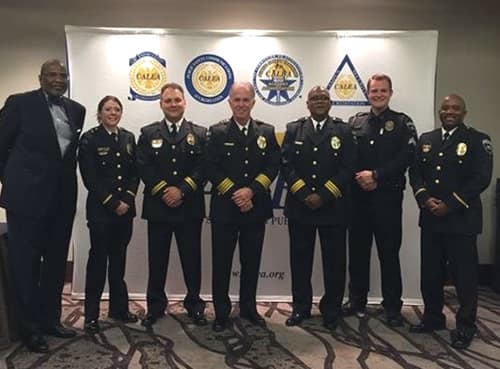
UNC Charlotte’s Department of Police and Public Safety (PPS) has been awarded accreditation by the Commission on Accreditation for Law Enforcement Agencies Inc. (CALEA). This distinction serves as the “international gold standard of public safety agencies.”
PPS Chief Jeff Baker and other members of the accreditation team were officially recognized for their achievement during CALEA’s most recent conference held in Charleston, S.C.
The accreditation process is voluntary but requires law enforcement agencies to commit to completing all compliance requirements within a set amount of time. UNC Charlotte officially enrolled in the CALEA program in June 2014 with a completion date of June 2017. Instead, PPS was able to achieve accreditation almost a year ahead of schedule.
Following enrollment, PPS completed a rigorous self-assessment, which focused on four primary areas: policy and procedures, administration, operations and support services. During this phase, PPS was required to comply with standards set forth by CALEA, develop proof of compliance and prepare for an onsite visit by CALEA officials.
“CALEA developed a set of essential standards for accreditation, ranging from how records are kept, to how and when our officers make arrests, to what equipment officers are and are not authorized to use in the field,” said Sgt. Travis Clark, who has served as the department’s accreditation manager since January 2016. “Most of these standards required us to develop internal policies to address these issues, and then show proof that the standards are being followed using a software platform that allows CALEA staff to remotely view our files each year.”
Following the self-assessment, PPS hosted an onsite visit by CALEA officials. The representatives interviewed and observed police personnel and inspected the department’s facilities and equipment. Additionally, an information session was held so faculty, staff and students could offer feedback on the department’s ability to meet CALEA standards and the relationship between PPS and the campus community.
“The response was overwhelming,” Clark said. “While we’ve worked hard to be responsive to the needs of the University, we were not expecting the level of support we received. Our assessment team referred to that moment as the highlight of their visit.”
The CALEA officials reported their findings to a governing board of 21 commissioners. During the conference held earlier this month, Baker and other representatives from PPS went in front of the commissioners for a final review, which culminated in the department being awarded accreditation.
“While CALEA accreditation is not a panacea for a law enforcement agency to be shielded from occasional scrutiny or criticism, it does provide a sound base of best practices for the development of law enforcement directives that will serve to guide us,” Baker said. “It is also a testament to the commitment our department has to our campus community. I am proud of the work my staff does day and night, maintaining the highest level of safety and security for our students, faculty and staff.”
Each CALEA accreditation cycle lasts four years, during which PPS will be required to maintain its standards of compliance. At the end of each cycle, there will be another on-campus assessment by CALEA officials and a hearing by the commission.